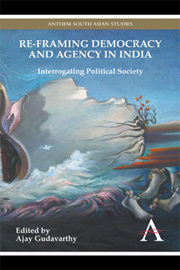Book contents
- Frontmatter
- Contents
- Preface and Acknowledgements
- List of Tables
- Chapter 1 Introduction: Why Interrogate Political Society?
- Part I Political Society and Protest Politics
- Chapter 2 Political Society in a Capitalist World
- Chapter 3 Antinomies of Political Society – Implications of Uncivil Development
- Chapter 4 Civil Society and the Urban Poor
- Chapter 5 Contentious Politics and Civil Society in Varanasi
- Chapter 6 The Politics of a Political Society
- Part II Political Society, Middlemen and Mobility
- Part III Civil Society and/or Political Society
- Part IV Rejoinder
- List of Contributors
Chapter 4 - Civil Society and the Urban Poor
from Part I - Political Society and Protest Politics
Published online by Cambridge University Press: 05 June 2012
- Frontmatter
- Contents
- Preface and Acknowledgements
- List of Tables
- Chapter 1 Introduction: Why Interrogate Political Society?
- Part I Political Society and Protest Politics
- Chapter 2 Political Society in a Capitalist World
- Chapter 3 Antinomies of Political Society – Implications of Uncivil Development
- Chapter 4 Civil Society and the Urban Poor
- Chapter 5 Contentious Politics and Civil Society in Varanasi
- Chapter 6 The Politics of a Political Society
- Part II Political Society, Middlemen and Mobility
- Part III Civil Society and/or Political Society
- Part IV Rejoinder
- List of Contributors
Summary
Introduction
Cities in developing countries have been the sites of dramatic wealth creation and consumption generated by the processes of globalization. Globalization has generated enormous wealth for those who are already wealthy, while at the same time pulling many sections of urban society into employments, income and consumption patterns which were hitherto unknown.
On the other hand, this unprecedented creation of wealth and opportunities have highlighted the plight of those who are excluded, in two senses. Firstly, there are thousands of people in cities who continue to be trapped in unskilled and semi-skilled work that brings low returns to hard labour, in traditional employments like the construction industry, or domestic service; globalization has possibly made some difference to them in terms of work availability (for example, through the boom in the construction industry in rapidly growing cities), but no significant opportunities have been generated to expand their life chances, or those of their next generation. Secondly, globalization itself has created a new workforce, as multinational producers locate manufacturing industries in Third World cities to take advantage of low wages. Typically, this has led to export zones, employing large numbers of semi-skilled or unskilled workers, often comprising a predominantly female workforce, with low wages and little security. Again, while this process has created a large number of urban jobs for the underclass, simultaneously new pockets of urban deprivation have been generated.
- Type
- Chapter
- Information
- Re-framing Democracy and Agency in IndiaInterrogating Political Society, pp. 73 - 92Publisher: Anthem PressPrint publication year: 2012



